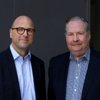Fritextsökning
Artiklar per år
Innehållstyper
-

“Conducting research at universities is becoming more and more like working at a research hotel”
The government wants Swedish research to focus on excellence and innovation, but can the two be combined? Life Science Sweden talks to Anna Falk, a professor at Lund University, about research policy, the constant hunt for funding in academia and what constitutes ‘fine research’.
-

Samuel Lagercrantz: “Companies that do this successfully will take the lead”
The development of new medicines and medical technologies should not focus too narrowly on prolonging life. It is equally important to develop treatments that relieve pain or eliminate painful symptoms, writes Samuel Lagercrantz in an editorial.
-

Carl Borrebaeck – professor and serial entrepreneur with a taste for speed
Award-winning cancer researcher, the founder of many listed companies, and constantly in the academic and commercial spotlight for decades. However, Carl Borrebaeck, Professor of Immunotechnology at Lund, is not yet satisfied. “We have a new, potentially super exciting project in the pipeline,” he says.
-

”We need compatibility“
Penilla Gunther, founder of Fokus Patient and chair of the European Patient Safety Foundation, hopes that the forthcoming life science strategy will focus on efficient and secure management of patient data and equal access to medicines.
-

Specific proposals and targets top the universities’ desired priorities
What are the universities’ expectations for the update of the national life science strategy? Life Science Sweden posed the question to representatives from Karolinska Institutet and Sahlgrenska Academy.
-

Samuel Lagercrantz: ”Drömmen blev en mardröm för life science-entreprenören”
En hyllad forskare och entreprenör i Västsverige tvingades lämna bolaget han själv grundat. Fallet har väckt stort intresse bland Life Science Swedens läsare. Samuel Lagercrantz, chefredaktör för Life Science Sweden, kommenterar fallet.
-

Anna Törner: “My quantified life”
“The expression ‘you can’t see the forest for the trees’ feels newly relevant in the context of wearables. One can easily get caught up in the idea that the more we measure, the more we know,” Anna Törner writes in a column.
-

A new special edition and a new event in Copenhagen – This is happening at Life Science Sweden 2024
The new year brings new features for the readers of Life Science Sweden.
-

The International Vaccine Institute’s office in Sweden is expanding
The International Vaccine Institute’s Stockholm office has been open for over a year. During the past year, training programmes and projects have been launched, says Anh Wartel, Head of the office.
-

Anna Törner: The clinical trial – Periscope to reality
What happens to the patients in the clinical trial is not very interesting, writes Anna Törner in a column.
-

The Swedish Academy of Sciences: “We have too many researchers”
Sweden does not need more researchers, but it does need better ones. According to the Royal Swedish Academy of Sciences, funding should be distributed to favour excellence.
-

Founder of Bioarctic, Lars Lannfelt, is honoured: “I want to create something for the future”
It´s like a scientist’s dream: to be the world’s first with a drug that genuinely affects one of our major diseases. Lars Lannfelt and his company Bioarctic have achieved just that, and they are thus making a significant contribution to the history of Swedish medicine. He is now being awarded the Research!Sweden Award 2023.
-

The first drugs to slow down Alzheimer’s – but what does it mean for patients?
New treatments for early Alzheimer’s are bringing hope to thousands of patients and their families. The question is, who will get the treatment, how will the right patients be found in time, and will the healthcare system’s resources be sufficient? Life Science Sweden has spoken to Swedish researchers in Alzheimer’s who voice cautious hope but also see further challenges.
-

Marie Gårdmark: ”The situation is not satisfactory”
”The legislative tool-box is limited, but carrots in the form of longer exclusivity has already proven successful, this has for example increased registration of new products in rare diseases. But will it also work to increase access for all EU patients?” writes Marie Gårdmark in a column.
-

The Swedish government is to increase its investment in cancer care
The Swedish government wants to invest more in cancer and paediatric cancer care and proposes to allocate SEK 500 million per year for this purpose in the coming years.
-

Lucy Robertshaw: Artificial intelligence – is this really going to transform a patient’s life?
In a column Lucy Robertshaw reflects on how AI and new regulations will affect healthcare, innovation and the lives of future patients.
-

Samuel Lagercrantz: The government’s performance in healthcare and life sciences so far
Since the change of government in Sweden, developments in the healthcare sector have shown promising signs, but the outlook in life sciences is less promising, writes Samuel Lagercrantz in an editorial.
-

Looking for greater Nordic cooperation – “We have Norway and Finland in our sights”
How can Medicon Valley Alliance bring the big pharmaceutical companies back to the organisation? Life Science Sweden discussed this topic and others with the cluster organisation’s new radar pair.
-

KI’s new President: “We need to work closer together”
A closer link between research and education and a stronger “we-feeling” are aims that Annika Östman Wernerson sets out to achieve as the new President of Karolinska Institutet. She will not give up her research entirely though. “I think it’s crucial to maintain a close presence in the business,” she says.
-

“I am driven by the desire to develop a product that can be sold worldwide”
Ranked number one in the world by the WHO in diarrhoea research and soon in phase III studies for its vaccine candidate – Scandinavian Biopharma is rushing forward in the pursuit of the world’s first ETEC vaccine. Meet the company’s CEO Björn Sjöstrand.
-

Column: ”Cheating with pea flowers and does it matter whether you are right?”
Is it possible to forgive shortcuts or outright cheating in science - if it turns out that the researcher was ultimately right? Anna Törner discuss this topic in a column.
-

The Swedish National Board of Health and Welfare rejects prioritising andrology as a speciality
Male infertility can be linked to a shorter lifespan and several severe diseases, but when couples who want children are examined, the focus is on the woman. Experts in the field claim that andrology needs to become a speciality in Sweden to increase awareness and knowledge. But the Swedish National Board of Health and Welfare says that it is not a priority.
-

Socialstyrelsen vill inte prioritera andrologi som specialitet
Manlig infertilitet kan hänga ihop med kortare livslängd och flera allvarliga sjukdomar, men när par som vill ha barn utreds ligger fokus på kvinnan. Experter inom området vill att andrologi nu ska bli en specialitet – men enligt Socialstyrelsen är det inte prioriterat.
-

Kan TBY-robotar bli ett tillskott till arsenalen inom precisionsmedicin?
Forskare från Kina presenterar i februarinumret av Science Advances en ny metod för målinriktad behandling vid inflammatorisk tarmsjukdom: en TBY-robot. En viktig komponent i roboten är jäst – samma sort som används för att ta fram en god öl, eller baka bröd, för den som föredrar det.